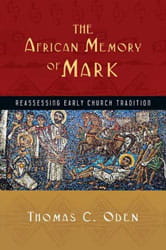 Now Featured at the Patheos Book Club:
Now Featured at the Patheos Book Club:
The African Memory of Mark:
Reassessing Early Church Tradition
By Thomas Oden
Book Excerpts:
Examining Church Tradition Within The African Memory of Mark
On the basic African memory of Mark (chapter 2, p. 36):
The African memory ofMark is an epic personal narrative. It begins with the birth and family of Mark, and their transit from Africa to Jerusalem. In traditional memory, Mark's family, fleeing civil disorder in Africa, moved to Palestine when Mark was young, sometime during the first three decades of the first century. He had joined Peter's mission by the early forties, and returned to Libya and Egypt in the forties or fifties to his death in the sixties.
On the sources of African tradition (chapter 4, p. 61):
The standard African memory of Mark is clearly and concisely set forth in. . . ancient official accounts meant for public reading in church services [synaxeries]. They were also used for private devotions. Only those most generally and consensually received in the larger worshiping community were collected and liturgically summarized for reading at annual feast days of the saints and martyrs.
On melding traditions to study Mark (chapter 7, p. 123):
The African narrative ofMark begins with Mark's birth in Africa and his family relationships. The sequence of Mark's Gospel begins with Isaiah, the beginning of the public ministry of Jesus, the call of the disciples and the miracles of the Galilean phase of his ministry. TheWestern sequence begins with the historical evidences for date and authorship and stylistic characteristics, and moves through the historical and socio-political evidences for the communities of faith that Mark presumably was speaking to. I am attempting to take a combination of these approaches, seeking for plausibility that would not neglect any of [them].
On the churches of Rome and Alexandria (chapter 8, p. 134):
The most fundamental insight we derive from the earliest sources regarding Mark . . . is the presumed strong connection between the founding of the church of Rome and the church of Alexandria...In this account the enduring apostolic connection between Roman Christianity and African Christianity hinges specifically on a personal link--that between Peter and Mark...The same good news was proclaimed in Africa on the premise that it was not "another gospel" but the identical gospel that had been preached by the apostles in Roman Asia and Europe.
On the martyrdom of Mark and the book's cover (chapter 8, pp. 154-56):
Mark was executed by torture and public humiliation by being dragged through the streets. . . . Just as the cross became a symbol of Jesus' selfsacrifice, so did the rope with horses become the symbol of Mark's sacrifice. . . . Mark's life prefigured his death. His life had been lived in a wide orbit of transit. His death was required when he had at last come back to the continent on which he was born.
On the relevance of these findings (chapter 9, p. 176):
Mark was the first of the eyewitnesses to the history of Jesus to preach the good news in a continent that now has almost a half billion believers. He was the first of untold numbers of Africans to give his life for the faith, the first to live out his baptism of fire on the African continent and likely the first apostle to be buried in African soil. The story that began in Libyan Cyrene would echo throughout both Asia and Europe. From the greatest intellectual center of Africa, Alexandria, would come the landmark intellectual tradition of Christian thought with unparalleled and lasting contributions to the history of education. From that intellectual traditionhas come a steady flow of brilliant literature that equals anything produced in Christianity's earliest centuries.
 Thomas C. Oden (Ph.D., Yale University), formerly Henry Anson Buttz Professor of Theology at The Theological School of Drew University in Madison, New Jersey, is now director of the Center for Early African Christianity at Eastern University, St. Davids, Pennsylvania. He is the general editor of the Ancient Christian Commentary on Scripture, Ancient Christian Texts and Ancient Christian Doctrine series as well as the author of Classic Christianity, a revision of his three-volume systematic theology.
Thomas C. Oden (Ph.D., Yale University), formerly Henry Anson Buttz Professor of Theology at The Theological School of Drew University in Madison, New Jersey, is now director of the Center for Early African Christianity at Eastern University, St. Davids, Pennsylvania. He is the general editor of the Ancient Christian Commentary on Scripture, Ancient Christian Texts and Ancient Christian Doctrine series as well as the author of Classic Christianity, a revision of his three-volume systematic theology.
For more on this new book, visit the Patheos Book Club here.
11/16/2011 5:00:00 AM




